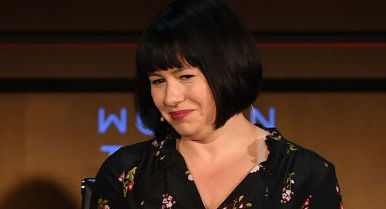NYT Columnist Touts Warren as ‘Unity Candidate’…While Also Disclosing Her Husband Works for Warren Campaign

Photo credit: Angela Weiss, AFP via Getty Images
In her latest New York Times column, published online on Monday evening, columnist Michelle Goldberg made the case for Elizabeth Warren as the “unity candidate” for the Democrats in 2020, even as the Warren and Sanders camps have traded public shots this past week. But in the fifth paragraph of the post, Goldberg also explained why she has mostly avoided discussing the Democratic race — and Warren in particular — for ethical reasons.
“I’ve hesitated to write too much about the Democratic primary because I have a conflict of interest,” Goldberg wrote, before noting, “my husband is consulting for Warren’s campaign.”
Goldberg’s husband, Matthew Ipcar, is the executive creative director at Blue State Digital, a digital strategy and technology firm based in Brooklyn. But the relationship between Blue State and the Warren campaign goes beyond mere vendor and client. Blue State’s founder and CEO, Joe Rospars, who led Obama’s digital campaign in 2008 and 2012, is also Warren’s chief campaign strategist and, as Politico story noted last summer, the company has been closely working with the Massachusetts senator since the very beginning of her 2020 run.
According to the most recent, 3rd quarter FEC filings, Blue State was paid $327,000 from July through September by the Warren campaign (the 4th quarter filings are not yet publicly available). Combined with 2nd quarter ($571,000) and 1st quarter 2019 payments ($183,089), Warren paid Blue State nearly $1.1 million in total through the first nine months of the year.
Almost one year ago, Goldberg first divulged her husband’s past work with Warren and his support for her upcoming presidential run in a preview of the 2020 Democratic primary where she expressed her enthusiasm for Warren and hailed her as a “brilliant policy innovator.” Since then, though, she has written a handful of other columns (out of several dozen in total) touching on the Democratic race without re-disclosing her husband’s role in the Warren campaign.
In April, right after Biden declared, Goldberg wrote a column effectively un-endorsing the former vice president: “The Wrong Time for Joe Biden.” In May, she contrasted real-life versus Twitter reactions to Democratic politicians, with Biden being the candidate drawing her focus. In June, she broadly praised the performance of the women candidates in the first Democratic debates, including Warren, and panned Joe Biden’s performance on the stump in two separate posts. Then, in August, Goldberg wrote two more columns that dealt with the primary, one on idiosyncratic Iowa voters (that mentioned Warren just once) and one offering an approving appraisal of Cory Booker.
The New York Times ethical handbook specifically addresses staff members whose families could influence their coverage, even for columnists like Goldberg who are obviously being paid to offer subjective analysis. “Any staff member who sees a potential for conflict or a threat to the paper’s reputation in the activities of spouse, friends or relatives must discuss the situation with his or her supervising editor and the standards editor or the deputy editorial page editor,” the handbook states.
However, Goldberg’s two, year-apart disclosures offer little transparency or consistency as to what ground rules her editors have set up for her coverage of the Democratic primary. As the 2020 field narrows and Warren’s potential role in the race looms larger, it becomes clear that something more than occasional, ad-hoc disclosures by Goldberg alone will suffice if the Times hopes to avoid yet another editorial page black eye in the future.






